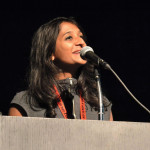Last year when it was announced that HIV/AIDS had become the No. 1 cause of death and disease among women ages 15 to 44 worldwide, I was, as strange as it might sound, relieved. Finally, we had the evidence to support what we have known all along: HIV is not exclusively a men’s disease—in fact, it’s ever increasingly a disease of women.
Even as the virus wallops more and more women and girls, there is still the (mis)perception that women don’t get HIV. I, too, held that belief—until HIV happened to me. And even then, I wasn’t fully convinced women were particularly vulnerable to the virus until I started my job at POZ and discovered the startling stats that about half of all people around the world with HIV are women. And nearly 26 percent of all American AIDS cases are among those of the female persuasion.
What is equally horrifying is that so many women are diagnosed late in disease progression—often discovering they have HIV and AIDS on the same day—because women don’t think they need to get tested for HIV and too many health care workers fail to understand that women get HIV.
Why is this happening? You will read about many of the reasons in “Wonder Women,” our feature story profiling seven remarkable women living with HIV. I’ve met countless HIV-positive women, and regardless of how they contracted the virus, most are driven by the same thing: They survive in order to take care of the people they love and who love them. And often, the last person they think of is themselves.
We women get the short end of the stick sometimes. Many of us struggle with self-esteem, access to rights and resources, power imbalances and our desire to feel safe and accepted. But if being a woman means at times we are vulnerable, it means at other times we are superhuman strong. Women who get knocked down often rise up, driven by a determination to give the care so many others require from us.
On the days when I think I can’t go on, I tap into my “inner woman” and draw on one of the most powerful forces I know: my desire to protect others. Then, my she-wolf, my mama-lioness, my warrior goddess comes out and I rise above whatever hardship I’m feeling and get on with the fight.
For years, I made the mistake of suffering (proudly, I erroneously thought) in silence, thinking the pain of facing HIV alone was less agonizing than the pain I would inflict on my family and friends if I got weak and cried out for help. But I now know I am not really helping anyone if I am not helping myself. How can I be a good daughter, sister, partner, auntie, friend, AIDS activist or global citizen if I’m an emotional and physical wreck because I’m too “selfless” to ask for help? We women need to prioritize taking care of ourselves while we take care of others.
So, in honor of National Women and Girls HIV/AIDS Awareness Day on March 10, I ask all women living with HIV to commit to taking as good care of themselves as they do those who surround them. Because if we do that, we’ll be able to spend the rest of our long lives helping those who need us. And the world will hear us roar.
Regan Hofmann
Editor in Chief
Email: editor-in-chief@poz.com






1 Comment
1 Comment